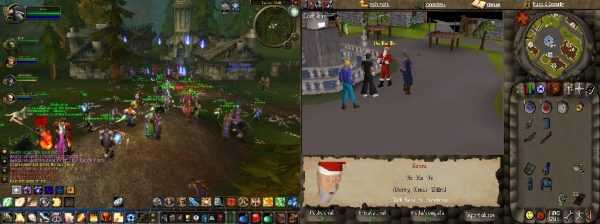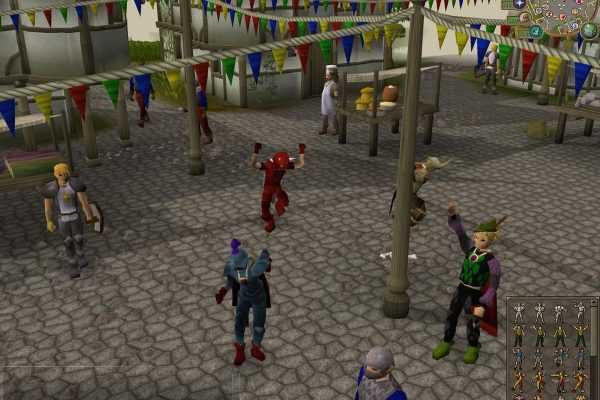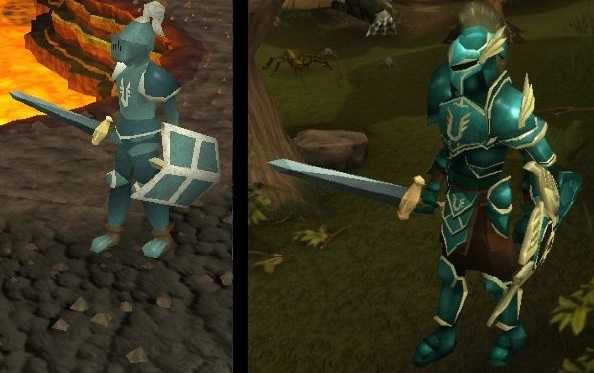The Fall and Rise of RuneScape - buy rs3 gold
Zak Hughes discusses the highs and lows of one of the most popular MMORPGs in his retrospective reminiscent of romantic RuneScape recollections
What was the best part of being a kid? Was it the lack of responsibility or expectation? The school days spent with friends? The summer holidays that seemed to stretch on for months? We've all got our own reasons to look back and be nostalgic, but many of us share a common one: RuneScape.
If you're in your twenties - or perhaps slightly younger - you'll likely have spent some obscene amount of time on the classic MMORPG. It was the after-school activity of choice for so many of us when bad weather forced us inside (though that was never the only reason to play). But why was it so popular at the time? How did this free online RPG, developed in Cambridge, capture the attention and the hearts of so many? And where is it today?
Just what happened to RuneScape?

I'll be up-front with you: it's hard for me to write about RuneScape without some level of bias - admittedly based mainly upon my own rosy-tinted nostalgia for the game. In case it isn't perfectly clear by now: I love it. I loved it then and I love the memories I have of it today but I am going to do my very best to look back at it now in the most objective way I can - for a while, at least.
The very first version of the game - now titled RuneScape Classic and still playable - came out in 2001 and was played by a relative few compared to its updated version but it was 'RuneScape 2' - the updated version we all know and love - that really took the MMORPG world by storm. 'RuneScape 2' (as it was not officially branded but became widely known as) was released in March 2004 after a rewriting of the original version's then-outdated engine. If the year 2004 seems familiar to MMORPG fans - then it should, as it was the year in which the gargantuan World of Warcraft was first unshackled. RuneScape's engine may have had several fresh coats of paint, but compared to WoW’s was like a Spitfire to an F-18. The running joke surrounding RuneScape was regarding just how bad it looked - even for the time - and many of the in-game models were laughable compared to World of Warcraft's full-3D graphics. The point-and-click control system seemed slow and unresponsive compared to WoW's keyboard-controlled movement, and the combat was, to put it bluntly, often boiled down to little more than just clicking on an enemy - as opposed to the smorgasbord of combat abilities and special moves that WoW's system utilized.
However, there was one thing that RuneScape had that Warcraft didn't - and that was simplicity. Whilst some enjoyed the complex gaming experience that WoW offered - with its damage spreadsheets and optimal character builds - many didn't want this, or understand nor care about this side of gaming. RuneScape was point-and-click, point-and-skill, point-and-kill, but it did this very well and in an extremely accessible manner. In its early days, the gameplay experience for the training of nearly every skill or the fighting of nearly every monster was little more than 'click on the thing and wait for x to happen', which made the core of the game open to anyone who could work a mouse. Advancing in any one of the 19 skills (upon 2004 release, currently 27) was often a simple task - but it was notoriously an extremely lengthy one.
For example, to advance the Fishing skill to its maximum level 99, a grand total of 13,034,431XP must be acquired - and considering catching a mid-tier type of fish would fetch around 90XP, just under 145,000 would need to be caught. This was grinding taken to an extreme level, but the obsessive desire to level up one's skills was a staple of the player base - despite the enormous time sink. Indeed, skilling in RuneScape was nothing short of harsh self-punishment, but the sense of achievement when the level-up messages for Defence or Cooking or Woodcutting appeared was sublime, as was the gratification that came from finding a new, faster method of advancing skills. RuneScape always found a way of making you want more of the monotony, no matter the social or mental health implication. It made you a prisoner - albeit one of your own device. Fans of the Civilisation series of games will be familiar with the notion of "Just one more turn", but for RuneScape players this was "Just one more inventory full of lobsters". The economy of the game often meant these skills wouldn't go to waste, either, and hard work - or hard grinding - almost always paid off once the fruits of one's labour were sold. Many who played the game as a kid will likely say they learned a thing or two about the art of the deal from days spent bartering with other players in RuneScape - along with the valuable lesson of "if something seems too good to be true, it probably is".

RuneScape's combat system operated on a rock-paper-scissors 'triangle' of melee, magic, and ranged attacks - each with strength over one of the other two but a weakness towards another (for example, ranged attacks did little damage against melee-based enemies but the equipment by rangers used had extra resistance to magical damage), but in reality this meant skirmishes were little more than a fight between two stat-weighted random number generators. When two players with identical gear and stats came face-to-face, luck was the deciding factor of who would go down first. Whilst on the face of it there was little input that a player could actually have in proceedings - beyond eating the occasional bit of food to restore health - this simplistic system actually spawned some fantastic opportunities for creativity and skill. The combat was 'tick' based, meaning that a fast finger on a mouse could allow the player to switch out an entire set of gear before the next attack animation and damage calculation began. This became a popular tactic in PvP, as two or even three corners of the combat triangle could be utilised to maximum effect - spawning the creation of countless over-edited ‘hybridding’ montages on YouTube, usually overlaid with Linkin Park.
“
RuneScape was point-and-click, point-and-skill, point-and-kill
The game's PvP element - also known as player-killing (often shortened to PKing) - became hugely popular, largely due to the initial simplicity of the combat system but also its potential for a player's skill and precise timing to tip the balance. The game's developers - Jagex (a shortening of the company's original slogan 'Java Game Experts' - before it was later unofficially changed to the somewhat forced 'Just About the Game Experience) were happy to allow the game's meta to shape itself, further endearing the structure of RuneScape's PvP combat with its die-hard players. Jagex weren't afraid to create new items that hilariously unbalanced the meta, with the player-driven economy having full control upon deciding an item's worth based on its performance. An entire stock market emerged inside the game based upon the trade of items, with little more indication of an item's worth than what someone was willing to pay for it in the moment.
That was, until the first of Jagex's hugely unpopular changes came, and the game's downfall - in the eyes of many - began.
The 'Grand Exchange' was implemented as a way for players to trade more easily - albeit less directly - with one another through a kind of auction-house-slash-stock-market. In the past, buying a new set of armour or a fresh weapon required a player to park themselves in one of the game's unofficial 'trading hub' cities and arduously type out the line "Selling 145k lobsters" for hours on end until enough deals could be struck to unburden the player of their surplus shellfish. With the implementation of the Grand Exchange, a player could search for an item to buy, or list all of the items they wished to sell for the pre-established market price, or any other custom value. Many criticised the objectively helpful update as the 'death of free trade', but the worst was to follow.

Whilst Jagex were happy to let overpowered items run amok there was one glaring issue that they would not abide - and rightfully so: so-called real-world trading; that is, the exchange of real money for in-game items. They saw this as a theft of their intellectual property and it made them furious - even going so far as to sue the creators of 'bot' accounts used for gold-farming for an amount that "exceeded six figures". In late 2007, Jagex removed the entire notion of 'free' trade from the game - meaning that all transactions must be fair in the eyes of the Grand Exchange, with a very limited margin for imbalance. This meant that the rewards for PvP were hugely neutered - as previously the victorious player would keep 100% of the spoils, the maximum value that could be dropped by a defeated combatant was severely limited to stop illegal trades. No longer could a player lend their friend a sum of money to help get their account started; nor could a player winning a PvP duel pocket more than a few thousand coins - compared to the hundreds of millions that were frequently put at stake. To say this update was extremely unpopular is a massive understatement, and it was the decision that ultimately led to many diehard fans quitting the game just months after the membership base passed one million. The decision was reversed just under four years later in early 2011, but by that point the damage had long been done. The active playerbase plummeted, and the game that had in its peak seen concurrent online-players in the hundreds of thousands was facing a mass exodus. This wasn't the death of RuneScape, however; nor was it the death of the game's unique quality. By this point, the game had seen 130 quests released - most of which written with the same tongue-in-cheek humour and occasional pop-culture references that lent some undeniable charm to the game and kept players interested, one seven-quest narrative even ended up spanning nearly 13 years.
“
RuneScape made you a prisoner - albeit one of your own device
2012 brought with it several nails that would find themselves hammered into RuneScape's coffin. The first of which was the odious, yet depressingly inevitable 'Squeal of Fortune' (a term which I'll use sparingly as the act of simply writing it causes me to vomit profusely) - a cynical gambling mechanic that allowed Jagex (and their new American majority shareholders) to squeeze microtransactions into the beloved MMORPG. Incredibly, however, this wasn't the year's least popular update, as a series of graphic changes took away the lovably chunky style of the game's armours in favour of shinier (and in my opinion far more boring) models. The final - and arguably the biggest - nail came with a complete overhaul of the combat system - replacing the simplistic tick-based system with a more complex mechanic that required the use of different abilities and constant player input - à la every other MMORPG under the sun. Whilst the system itself wasn't actually all that horrible and could somewhat be seen as an improvement, it - along with the armour visuals update - demonstrated just how tone-deaf Jagex were in regards to what the majority of veteran players loved about the game. Jagex eventually realised that, almost unbearably cynically, they could sell the old, beloved armour designs as cosmetic items for real-world money (demonstrating that the practice of so-called real-world trading was in fact okay, as long as Jagex were doing it). The 'Evolution of Combat' - as the overhaul was titled, led to yet more players quitting and would be the final straw that broke Runescape's back; and yet the game wasn't fully dead, rather trapped under a mound of overly-controversial game-altering updates.

Finally though, Jagex realised the obvious - something so frequently requested that it almost become a running joke: that they should re-release the version of the game people had originally fallen in love with. Unofficial private servers containing rolled-back versions of the game were becoming more popular as the game changed what it was, and it took up until 2013 for Jagex to realise they themselves could tap into their success. Their plan was genius: 2007's RuneScapebrought back exactly how it was, with user polls deciding upon future updates and tweaks so as to not piss off the notoriously conservative fanbase. It was such a good idea, in fact, that Blizzard recently announced their own plans to release rolled-back versions of World of Warcraft. RuneScape’s legacy version turned out to be a fantastic success, and even today player numbers of 'Old-School' RuneScape far outweigh that of the shiny 'EoC' version. Jagex realised that nostalgia sells, to great effect - and finally, the players who had become so alienated by change had their game back. To Jagex's credit, both versions of the game - 'old' and 'new' - receive frequent updates and fixes, though it seems history is doomed to repeat itself and they will continue branching out different paths until one is entirely unrecognisable from the other.
It's often said that one never truly 'quits' RuneScape, more-so you take extended breaks. Like many MMORPGs of the early-to-mid 2000s, the game is like a black hole: pulling old players back in with the simplicity and addictive nature of its progression - complete with the time dilation one experiences when playing for a few/lots of hours/days. Even whilst gathering the research for this article I had to resist the urge to get too close for fear of nostalgia taking hold and dragging me back in. Just like The Eagles' Hotel California, "you can check out any time you like, but you can never leave". So go and rediscover RuneScape - it really hasn't changed that much - but be careful: nostalgia is a powerful drug.
You can buy rs3 gold at our site https://www.4mmog.com/runescape-gold . Thank you.
